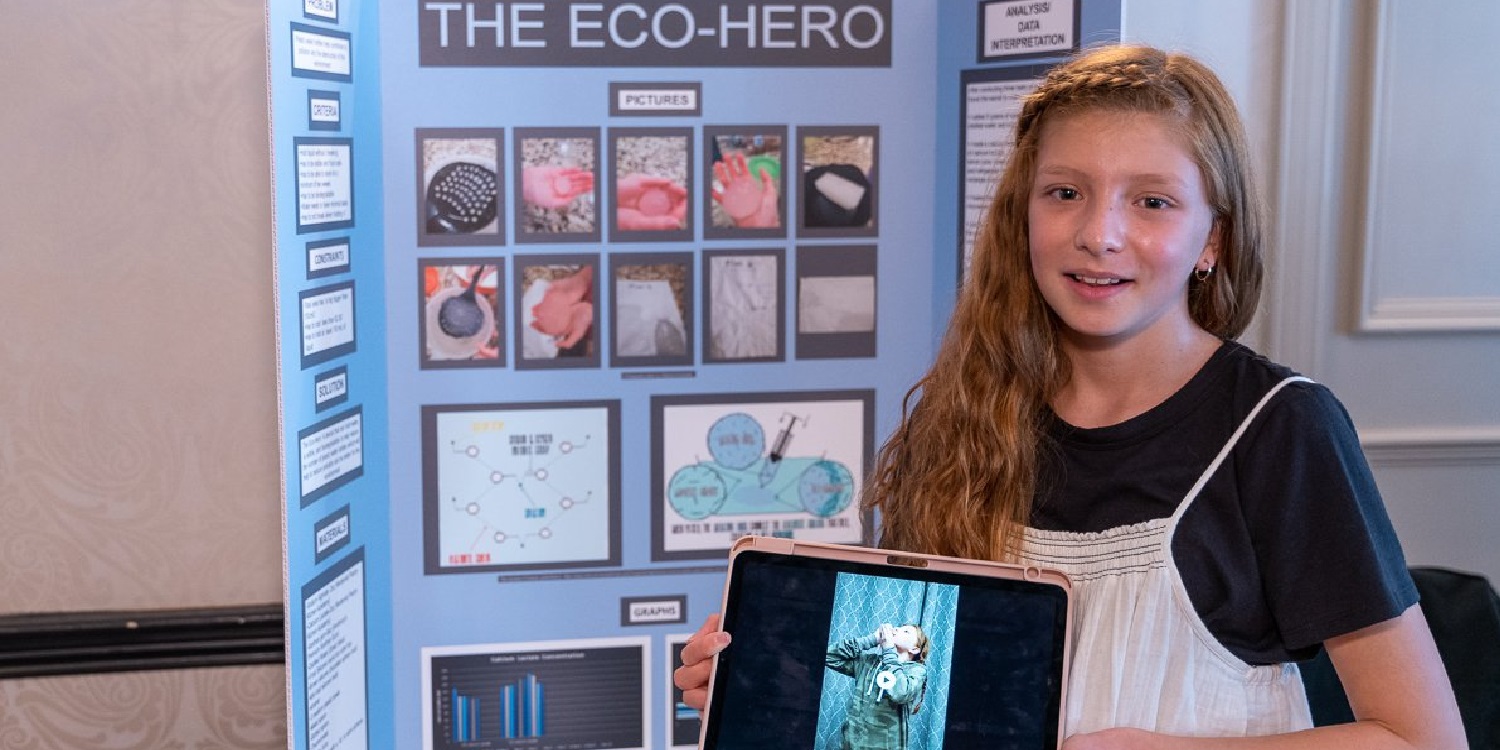Madison Checketts has loved the beach for as long as she can remember and easily spotted plastic water bottles cluttering around the sand and ocean when going on family vacations. So, the 12-year-old girl decided to do something about it and designed an edible water bottle called Eco-Hero.
An Edible Water Bottle
 Madison Checketts designed an edible water bottle to reduce plastic pollution after researching the issue. She presented the bottle at a science fair, where she won first place at the state level and became a finalist in the 2022 Broadcom Masters Competition, a prestigious STEM competition for middle school students.
Madison Checketts designed an edible water bottle to reduce plastic pollution after researching the issue. She presented the bottle at a science fair, where she won first place at the state level and became a finalist in the 2022 Broadcom Masters Competition, a prestigious STEM competition for middle school students.
Checketts was surrounded by other young inventors who had developed projects like a remote-controlled robotic hand for use in natural disasters and a foot-controlled welcome mat for individuals with hand conditions.
Madison Checketts Battles Plastic Pollution
 As she began her research, Checketts asked herself how she could contribute to making the world a better place. One of the issues that immediately came to mind was the problem of plastic pollution. Single-use plastic products like water bottles are used and discarded, with the majority not being recycled. In the USA alone, more than 30 billion plastic water bottles are consumed each year, many of which end up in the ocean, where they contribute to the estimated 5.25 trillion pieces of plastic waste currently circulating there.
As she began her research, Checketts asked herself how she could contribute to making the world a better place. One of the issues that immediately came to mind was the problem of plastic pollution. Single-use plastic products like water bottles are used and discarded, with the majority not being recycled. In the USA alone, more than 30 billion plastic water bottles are consumed each year, many of which end up in the ocean, where they contribute to the estimated 5.25 trillion pieces of plastic waste currently circulating there.
Plastic pollution is a major threat to marine ecosystems and wildlife. For example, marine animals such as turtles may mistake plastic waste for food and ingest it, leading to blocked stomachs, illness, and other internal damage. Additionally, depending on the chemical properties and environmental conditions, plastics can release toxic chemicals and contaminants into the ocean.
Edible Reverse Spherification Water Bottle
 Checketts experimented with reverse spherification, a technique used to enclose liquid in a gel membrane to create an edible water bottle. She used calcium lactate and sodium alginate, common food additives that form a gel membrane when mixed together, as well as xanthan gum and lemon juice. After several attempts, she successfully created a prototype in a blender.
Checketts experimented with reverse spherification, a technique used to enclose liquid in a gel membrane to create an edible water bottle. She used calcium lactate and sodium alginate, common food additives that form a gel membrane when mixed together, as well as xanthan gum and lemon juice. After several attempts, she successfully created a prototype in a blender.
The Eco-Hero is an edible, biodegradable water bottle that holds about three-quarters of a cup of water and costs about $1.20 to make. To use it, the consumer bites a hole at the top of the gelatinous membrane, drinks the water, and then either eats the membrane or throws it away. The drink has a slight lemon flavor, and the edible membrane tastes slightly lemony but becomes tasteless as it is chewed. It has the texture of a gummy bear. Environmental scientist Daniel Rittschof of Duke University, who has worked with the reverse spherification technology used in the Eco-Hero, believes the concept is promising.